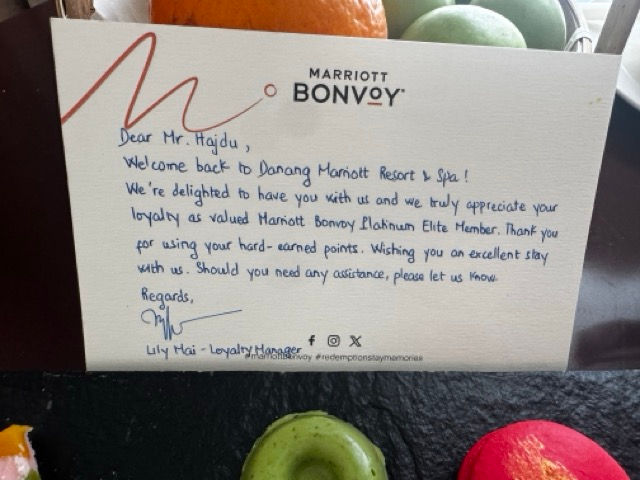Breaking the Personalization Paradox in Hotels
- David Hajdu
- Aug 31, 2025
- 3 min read
Updated: Sep 3, 2025
I'm sitting in a Marriott hotel room, surrounded by paper, folded brochures, printed menus, and a welcome letter with my name typed at the top.
On the desk sits a "welcome amenity" basket: juice I won't drink, crackers I don't want, and some strange fruit I can't identify.

What I actually want is information about tennis courts, water sports options.
Unfortunately for me on my birthday weekend, a list of restaurants serving Italian, Korean or Vietnamese food (without onions, please), or a quiet workspace with decent coffee isn't mentioned anywhere.
This disconnection between what hotels provide and what guests actually desire reflects a fundamental problem in hospitality today. Hotels have access to unprecedented amounts of data but struggle to translate it into personalized experiences that matter.
The Personalization Paradox
Hotels want to create personalized experiences for their guests. To do this effectively, they need comprehensive data about preferences and habits. But here's the catch: guests only willingly share that data when they already feel the hotel understands them. It's a classic chicken-and-egg situation.
Most hotels collect basic information, names, birthdays, room preferences, but fail to transform this into meaningful, memorable experiences.
When guests don't see value from sharing information, they become reluctant to share more, creating a downward spiral of generic service.
Reimagining the Guest Experience
Imagine checking into a hotel where the experience begins long before arrival. Upon booking, you gain access to an AI-assisted concierge app that speaks to you like a caring human, available 24/7 in your preferred language.
This digital concierge already knows you don't like onions and offers a special on the hotel's newest crab pasta dish. It suggests booking a tennis coach and recommends potential times based on availability.
When you arrive, the front desk smoothly processes your documents, hands you a key, wishes you a happy birthday, and asks if you'd like to book a massage at a local spa after your tennis session – all because the system knows these are experiences you value.
This isn't science fiction.
It's what my clients are working towards, hyper-personalization that makes guests feel truly seen and understood.

AI Isn't the Problem, It's The Data Behind It
The revelation many hospitality brands are having is that AI itself isn't the challenge. The technology exists. The bottleneck is how we collect, connect, and activate data to create personalized experiences that guests genuinely appreciate.
What's needed is an AI Personalization Flywheel – a virtuous cycle where:
Hotels capture guest signals from every interaction
AI extracts meaningful insights from these signals
These insights drive truly personalized experiences
Better experiences encourage guests to share more information
More information powers even better personalization
Unlike traditional linear approaches to guest data, this flywheel builds momentum with each cycle. Hotels implementing this approach have seen up to 30% revenue growth as guests respond to experiences tailored specifically to them.
Breaking Free from Paper and Unwanted Fruit
The future of hospitality isn't about more expensive amenities or fancier lobbies. It's about creating personalized experiences that demonstrate understanding of what each guest truly values.
This might mean fewer generic welcome baskets and more personalized digital touchpoints. Less paper and more prediction. Fewer standardized offerings and more surprise-and-delight moments based on actual preferences.
For hotels, the competitive advantage will come not from collecting more data but from creating more value from each interaction. When guests feel understood, they become willing participants in the personalization process rather than reluctant subjects of it.
As I look at my untouched welcome basket in this Marriott room, I can't help but think how much more memorable this stay could be if the hotel redirected those resources toward experiences I'd actually value.
The technology exists. The data foundations are there. What's needed now is a fundamental shift in how hospitality brands think about personalization; not as a marketing tactic, but as the core of the guest experience itself.
After all, isn't feeling truly understood the greatest luxury a hotel can offer?
















Comments